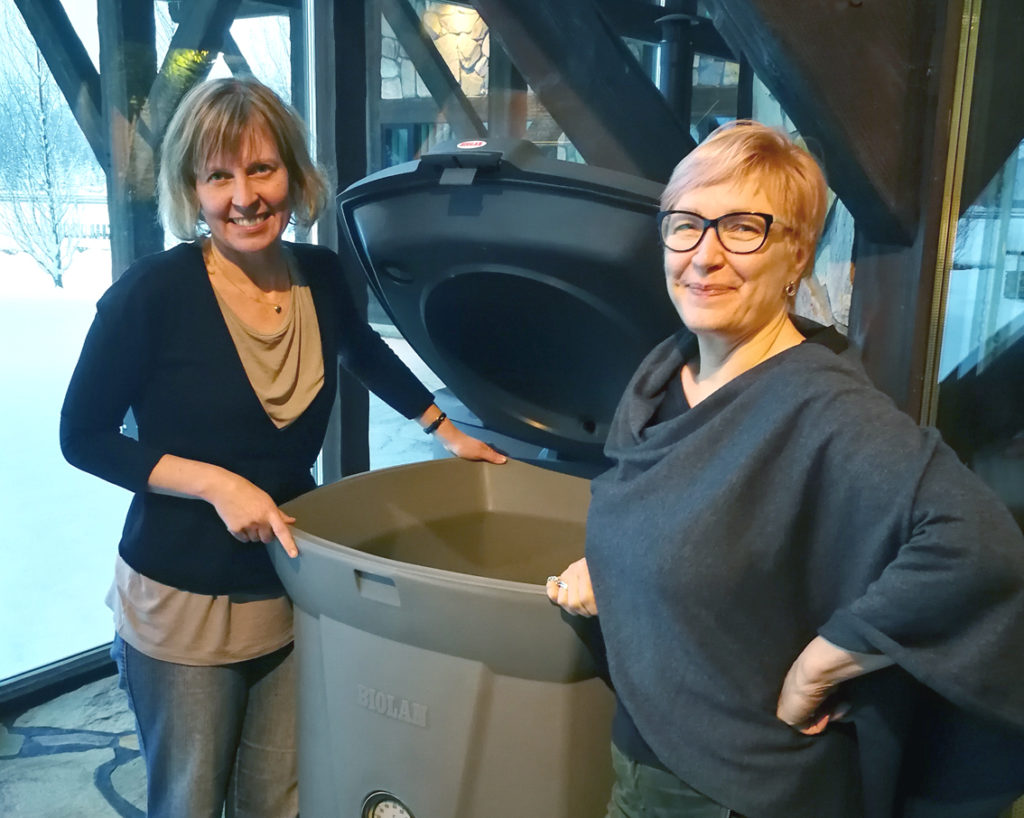18.12.2017 - Johannes Puro - Internet of Things

Composting is a traditional practice of returning your household foodstuff or other biowaste back to the soil naturally. For modern people it is not just practical but also an easy way of reducing one’s environmental load.
Since composting goes well with today’s green values it is not surprising that soon there will also be an enhanced version of the traditional model.
Biolan Ltd, a company known for their environmental products, is currently building an intelligent composter that utilizes advanced IoT-technology. As part of the BioÄLY-project together with Tekes (Finnish Funding Agency for Innovation), they are creating a common IoT-platform and installing sensors to composts in order to collect data about the conditions in the composting units.
– Our aim is to create smart compost that guides the user on how to maintain it properly, tells Hannamaija Fontell, the Director of Business Development of Biolan.
– The device can give feedback on temperatures or the need for new bedding material to optimize the circumstances. In the future, the system might even convey offers and discount codes from local storekeepers based on geographic information, she tells.
The product development of smart compost serves also the special needs of different market areas. An intelligent system helps to tackle varying circumstances regardless of whether the climate is hot, cold, moist or dry.

Children of Jade Kindergarten composting garden waste.
Geographically, one of Biolan’s largest market areas is China where they ship composts and composting dry toilets.
– At least one container load of composts ships off to China every month, their demand is really on the rise now, explains Riikka Kerttula, garden advisor and communications officer at Biolan.
The development has not been fast when dealing with as big a country as China is, but ecological alternatives are becoming increasingly popular among citizens since the central kitchens have begun to appreciate environment friendly solutions such as composts.
– People now see this as a way of taking action on environmental issues. In China there is a green awakening in progress and it is a huge thing to see that the change has proceeded already to consumer level.

The purpose of educational gardens is to familiarize people with cultivation and support them to grow their own food.
Besides the export of composts, Biolan has founded several educational gardens in China where they teach composting and farming of vegetables as a part of environmental education. With the use of composts they are educating local families about nutrient cycle and how to use the soil from compost as a substrate for cultivation in their own family gardens.
“You are definitely cooler if you compost.”
Even though composting can save money on waste charges, the devices are still comparatively expensive for consumers in China. Still surprisingly many people find it worth investing. According to Fontell, the compost has become something of a status symbol.
– You are definitely cooler if you compost, she laughs but becomes serious again:
– Of course in China, one of the most important aspects of compost lies in the safety and purity of food.
From Northern European perspective the extent of the question might be hard to perceive but China, along with other major countries in food industry, has fought against counterfeit food for a long time. Fake products are a serious problem causing real health hazards to citizens.

The kindergarten children are learning how to grow vegetables.
– You don’t really have many ways of knowing for sure what’s in the can when you buy for example powdered milk. It can be the real deal or it can even be something dangerous. The more people produce their own food, the more they have power over what they actually eat, Kerttula describes.
“The more people produce their own food, the more they have power over what they actually eat.”
– Nowadays chinese people value pure food and are willing to pay more of their groceries to ensure the quality and safety of them. Parents have also started to favor kindergartens and schools that have educational gardens so growing fresh vegetables and making pure food does bring real added value to schools, Fontell explains.
Novarbo, an affiliated company of Biolan Group, is currently working on a project called “Novamoni” which aims to build Plant Factories to China. In their multi-layer greenhouses they are going to grow fresh lettuce and local vegetables cleanly to Chinese market.
In ecological sense, making use of the gardens and composts optimally supports the local nutrient cycle. The nutrients and soil from composting can be utilized in your own garden which lessens the need to purchase them from somewhere else. The earth is already running out of phosphorus which is a non-renewable natural resource and a problematic substance in many ways.
Besides the endangered nature of it, phosphorus has an undesirable habit of accumulating in sewage and water systems causing eutrophication. Moreover, a large part of it is manufactured in politically unstable territories in northern Africa.
“Composting as a safe way of producing the needed substances without the heavy processing, factories and logistics of the industry.”
– Without interference, we will run out of phosphorus in 50 years or so. Our kids will live to see the consequences unless we manage to slow down the consumption by natural means, Kerttula tells.
– Considering all that, we see the nutrient recovery by composting as a safe way of producing the needed substances without the heavy processing, factories and logistics of the industry.
It is obvious that composting has significant advantages, but according to the experts of Biolan, composting is also considered to increase happiness – just like recycling altogether.

– Consumer surveys show that people require more ecological alternatives nowadays and want to have a good conscience with their choices. I think we need the feeling of doing at least something for the world on our part, Fontell ponders.
– Of course as a practise, composting has been there for ages, but modern technology helps making it as efficient as possible to benefit all.
– And gardening with compost is very satisfying – you get to see the tangible results of your work when you place the biowaste to the compost and then use the soil you’ve produced to grow a pumpkin or some tomatoes, Kerttula closes.
Video from the Biolan garden for Newton Kindergarten in Suzhou
Interviewee
Author

Leave comment - comments(0)